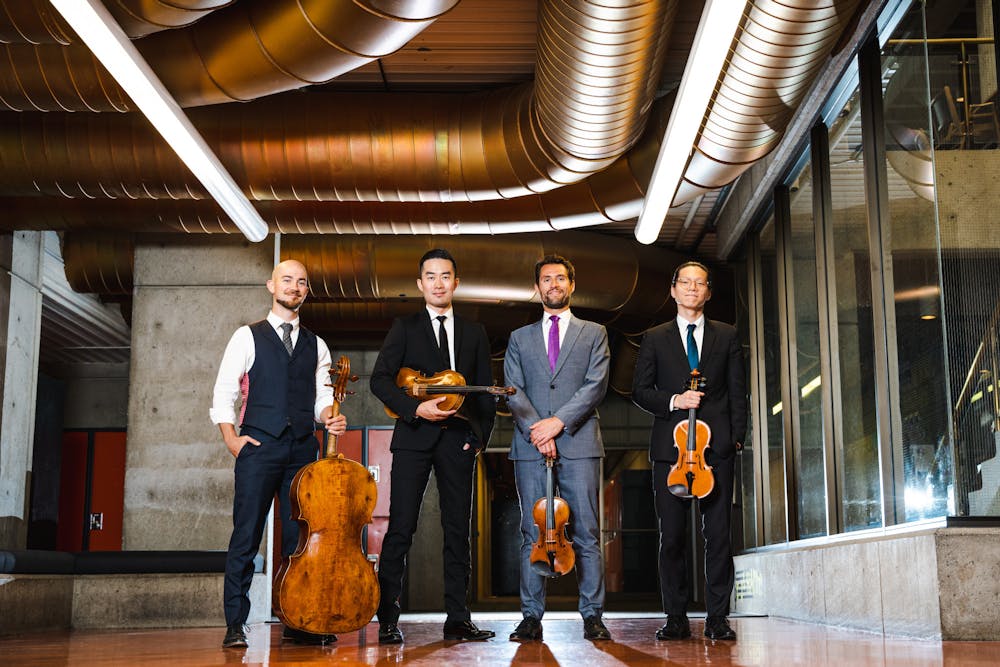The Shriver Hall Concert Series routinely brings virtuosic professional musicians to give concerts at Hopkins. On Feb. 26, the Dover Quartet was joined by double bassist Joseph Conyers to play pieces by Joseph Haydn, George Walker and Antonín Dvořák.
The Dover Quartet is an ensemble that has toured all over the world and holds a faculty role at the Curtis Institute of Music. They have been nominated for two GRAMMYs in the category of Best Chamber Music/Small Ensemble Performance. The quartet consists of violinist Joel Link, violinist Bryan Lee, violist Hezekiah Leung and cellist Camden Shaw.
Conyers is currently an associate principal bass for The Philadelphia Orchestra and founder of the nonprofit organization Project 440. Though he didn’t play for the first two quartets, Conyers joined the ensemble for the final quintet.
To kick off the show, the ensemble played Haydn’s String Quartet in E-flat major, Op. 33, No. 2 or, as it is more commonly known for its multiple fake endings, “The Joke.” As they began to play, I could immediately hear the tone’s extraordinary warmth and smoothness through the musician’s technique — a magical quality to the music that no electric speaker could ever reproduce. Their bows eased gracefully across the strings, as if dipped in butter, rich and smooth.
The Haydn was full of lively, sauntering melodies, playful gestures and sweet pastoral tunes. There were phrases passed between players, notes that slid into each other like a slide whistle and the famous fake-out endings that have given the piece its nickname. In one of the last fake endings, the musicians even pretended to put down their instruments before surprising the audience with a final continuation of the piece, getting a giggle out of everybody.
After the Haydn, Shaw briefly spoke to the audience, complimenting Shriver Hall and introducing Conyers and the next two pieces.
Shaw also gave a brief background about Walker, the composer of the next piece. Walker was a composer who wrote during the 20th century and was the first Black student at the Curtis Institute, where he studied both piano and composition. Although Shaw maintained that Walker’s sound was entirely his own, he contended that some might hear similarities in Walker’s music to the more famous composer Samuel Barber, since they studied under the same teacher.
The quartet played Walker’s String Quartet No. 1, which was easily my favorite piece of the evening. When they began to play, the earlier clarity and mellow sound of the Haydn was gone. The musicians played with an extra roughness and grit for this song that created a big, cinematic and passionate effect. Whereas the Haydn had felt playful and sweet, the Walker felt fierce, colorful and real.
There were several motifs that beautifully echoed through the piece as the musicians passed the phrases on to each other. At the end of the first movement, the members of the Dover quartet briefly smiled at each other, well aware that they had spectacularly nailed it.
But the second movement was my favorite. Earlier, Shaw had mentioned that Walker had dedicated it to the memory of his grandmother, and I listened to it with that context in mind. It was much warmer than the first movement, bringing a sense of sweet nostalgia and loss. It sounded like grief, with moments of sublime harmony tempered by an edge of sorrow, as if the piece acknowledged the pain of loss but still held onto the knowledge that there will be joy again. By the end, I was close to tears.
The third piece was Dvořák’s String Quintet in G Major, Op. 77. This was the piece where Conyers came in to play on bass, and I loved the new dimension it added to the sound. At first, it was a little bit jarring to hear the lower frequencies, but after the first movement, I could not imagine how I had listened to the other pieces without having that fullness of register. The Dvořák piece was fierce and alive but also joyful and sweet, with long meandering melodies and big romantic gestures.
When the musicians finished playing, the audience gave a standing ovation that lasted so long that the quintet walked off the stage twice only to return to give more bows for the enthusiastic applause. This was truly a spectacular performance, and I left the concert hall in a daze, my mind still enthralled by the incredible music I had just heard.





